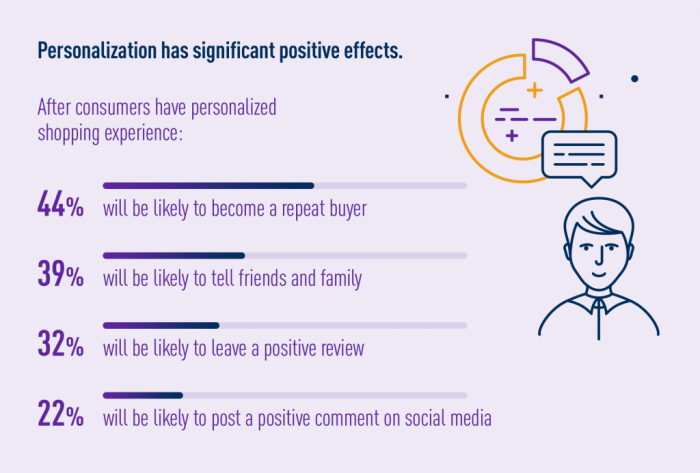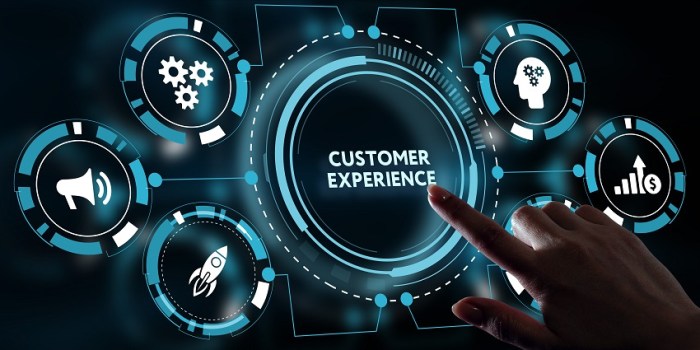Personalizing Customer Experiences takes center stage in the business world, revolutionizing how companies connect with their clientele. From tailored recommendations to seamless interactions, this topic dives deep into the art of creating meaningful customer relationships.
In today’s competitive market, understanding the significance of personalized experiences can set businesses apart and foster long-term loyalty.
Importance of Personalizing Customer Experiences
In today’s competitive business landscape, personalizing customer experiences is more crucial than ever. By tailoring interactions to meet the individual needs and preferences of customers, businesses can create a unique and memorable experience that sets them apart from the competition.
Enhanced Customer Engagement
Personalizing customer experiences allows businesses to engage with their customers on a deeper level. Through personalized communication and tailored recommendations, companies can build stronger relationships with their customers, leading to increased loyalty and trust.
- Amazon is a prime example of a company that excels in personalizing customer experiences. By using data analytics to track customer behavior and preferences, Amazon can recommend products that are tailored to each individual’s interests.
- Netflix also leverages personalization to enhance the user experience. By analyzing viewing habits and preferences, Netflix can suggest movies and TV shows that are likely to appeal to each viewer, increasing customer satisfaction and retention.
Improved Customer Loyalty and Retention
When customers feel valued and understood, they are more likely to remain loyal to a brand. Personalizing customer experiences can help businesses retain customers over the long term, reducing churn rates and increasing lifetime customer value.
- Starbucks is known for its personalized customer experiences through its rewards program and mobile app. By offering personalized offers and recommendations based on purchase history, Starbucks has been able to create a loyal customer base that keeps coming back for more.
- Sephora is another company that has successfully implemented personalized experiences through its Beauty Insider program. By providing tailored product recommendations and exclusive offers, Sephora has built a community of loyal customers who trust the brand for their beauty needs.
Strategies for Personalizing Customer Experiences

Personalizing customer experiences is crucial for building strong relationships and increasing customer loyalty. Companies can employ various strategies to tailor their interactions with customers based on their preferences, behaviors, and needs. By utilizing customer data, artificial intelligence (AI), and automation, businesses can create personalized experiences that resonate with individual customers.
Using Customer Data
One effective strategy for personalizing customer experiences is to leverage customer data. By analyzing data points such as purchase history, browsing behavior, and demographic information, companies can gain valuable insights into customer preferences and tailor their offerings accordingly. For example, an e-commerce company can recommend products based on past purchases or show targeted ads to customers who have shown interest in specific products.
AI and Automation
Artificial intelligence and automation play a significant role in personalizing customer experiences at scale. AI algorithms can analyze large datasets to identify patterns and predict customer preferences, enabling companies to deliver customized recommendations and content in real-time. Chatbots powered by AI can provide personalized assistance to customers, resolving queries and issues quickly and efficiently.
Omnichannel Approaches
Omnichannel strategies are essential for creating seamless and consistent customer experiences across multiple touchpoints. By integrating data from various channels such as websites, mobile apps, social media, and physical stores, companies can deliver personalized messages and offers to customers wherever they are. For instance, a customer who browses products online can receive a personalized email with recommendations or discounts when they visit a physical store.
Implementing Personalization in E-commerce
Implementing personalization in e-commerce is crucial for creating a tailored shopping experience for customers. By utilizing various strategies, e-commerce businesses can enhance customer satisfaction and increase sales. Let’s delve into how e-commerce businesses can effectively implement personalization.
Personalizing Product Recommendations
Personalizing product recommendations is a key strategy in e-commerce to engage customers and drive sales. By analyzing customer behavior, purchase history, and preferences, e-commerce platforms can recommend products that are relevant to individual customers. This can be achieved through collaborative filtering algorithms, which analyze customer data to suggest products similar to those previously purchased or viewed.
Utilizing Personalized Emails, Discounts, and Promotions
Personalized emails, discounts, and promotions are effective tools for engaging customers and driving sales in e-commerce. By segmenting customers based on their preferences and purchase history, e-commerce businesses can send targeted emails with personalized product recommendations, discount offers, and promotions. This personalized approach can increase customer loyalty and encourage repeat purchases.
Importance of User-Friendly Interface for Personalized Experiences, Personalizing Customer Experiences
A user-friendly interface is essential for delivering personalized experiences in e-commerce. A well-designed interface that is easy to navigate and provides relevant product recommendations can enhance the overall shopping experience for customers. By implementing features such as saved preferences, personalized recommendations, and easy checkout processes, e-commerce businesses can create a seamless and personalized shopping journey for their customers.
Technology and Tools for Personalization: Personalizing Customer Experiences

In the digital age, technology plays a crucial role in personalizing customer experiences. From CRM systems to personalization engines, various tools are utilized to tailor interactions with customers based on their preferences and behaviors.
Common Technologies for Personalization
- CRM Systems: Customer Relationship Management systems help companies manage and analyze customer data to create personalized experiences.
- Personalization Engines: These tools use algorithms to deliver tailored content, product recommendations, and offers to individual customers.
- Data Analytics Tools: Tools like Google Analytics and Adobe Analytics provide insights into customer behavior, enabling businesses to optimize personalized strategies.
AI and Machine Learning in Customer Personalization
AI and machine learning are revolutionizing customer personalization by enabling real-time analysis of vast amounts of data. These technologies can predict customer preferences, recommend products, and automate personalized interactions, enhancing the overall customer experience.
Challenges and Benefits of Using Technology for Personalized Experiences
- Challenges: Implementing and integrating new technologies can be complex and costly. There may also be concerns about data privacy and security when collecting and utilizing customer data for personalization.
- Benefits: Technology allows businesses to deliver relevant and engaging experiences to customers, leading to increased customer satisfaction, loyalty, and ultimately, higher revenue. It also enables businesses to scale personalization efforts and adapt to changing customer needs more effectively.